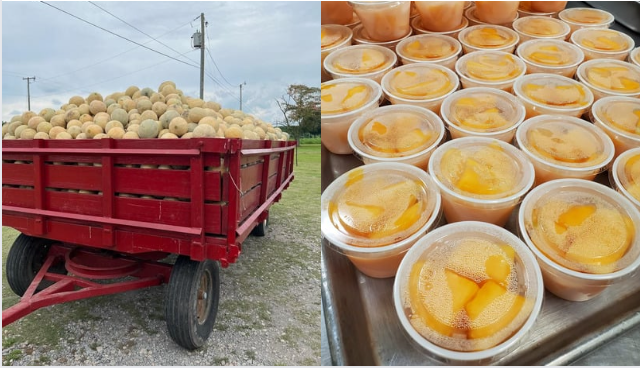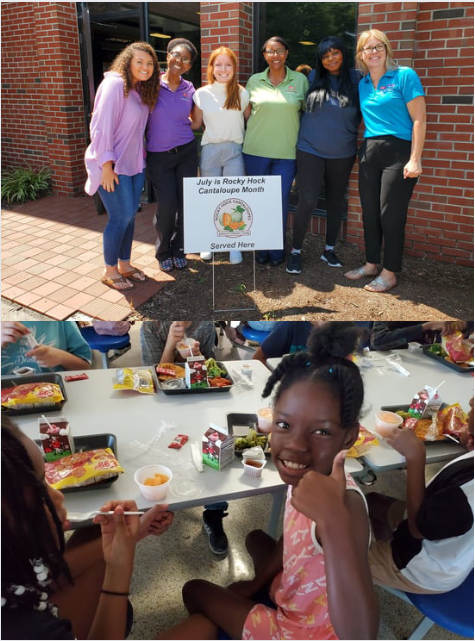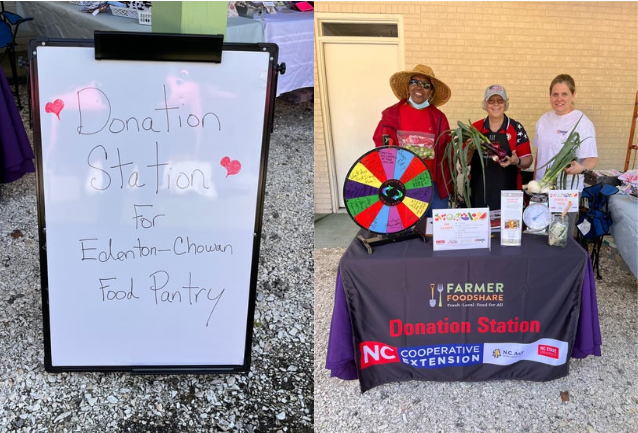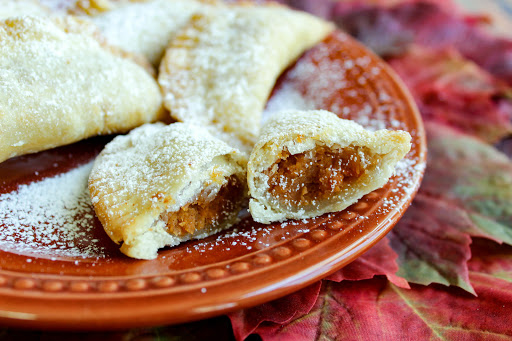Connecting Horticulture and Local Food: A Conversation With Sarah Richardson
go.ncsu.edu/readext?967775
en Español / em Português
El inglés es el idioma de control de esta página. En la medida en que haya algún conflicto entre la traducción al inglés y la traducción, el inglés prevalece.
Al hacer clic en el enlace de traducción se activa un servicio de traducción gratuito para convertir la página al español. Al igual que con cualquier traducción por Internet, la conversión no es sensible al contexto y puede que no traduzca el texto en su significado original. NC State Extension no garantiza la exactitud del texto traducido. Por favor, tenga en cuenta que algunas aplicaciones y/o servicios pueden no funcionar como se espera cuando se traducen.
Português
Inglês é o idioma de controle desta página. Na medida que haja algum conflito entre o texto original em Inglês e a tradução, o Inglês prevalece.
Ao clicar no link de tradução, um serviço gratuito de tradução será ativado para converter a página para o Português. Como em qualquer tradução pela internet, a conversão não é sensivel ao contexto e pode não ocorrer a tradução para o significado orginal. O serviço de Extensão da Carolina do Norte (NC State Extension) não garante a exatidão do texto traduzido. Por favor, observe que algumas funções ou serviços podem não funcionar como esperado após a tradução.
English
English is the controlling language of this page. To the extent there is any conflict between the English text and the translation, English controls.
Clicking on the translation link activates a free translation service to convert the page to Spanish. As with any Internet translation, the conversion is not context-sensitive and may not translate the text to its original meaning. NC State Extension does not guarantee the accuracy of the translated text. Please note that some applications and/or services may not function as expected when translated.
Collapse ▲ While only having been in Extension for a short time, Sarah Richardson is developing relationships with growers and connecting them to research to help the local food landscape thrive in her three county area. Sarah serves as the Commercial Horticulture Agent for Gates, Chowan, and Perquimans counties where she assists growers with several aspects of production of fruit and vegetables, including but not limited to, insect and disease monitoring, preventative spray programs, greenhouse management, and on farm trapping to indicate timely insecticide applications. Sarah works hard in her day-to-day work to be the outreach arm relaying university research to her growers to help make better management decisions on their operations while also raising awareness about agriculture and food access in her community.
While only having been in Extension for a short time, Sarah Richardson is developing relationships with growers and connecting them to research to help the local food landscape thrive in her three county area. Sarah serves as the Commercial Horticulture Agent for Gates, Chowan, and Perquimans counties where she assists growers with several aspects of production of fruit and vegetables, including but not limited to, insect and disease monitoring, preventative spray programs, greenhouse management, and on farm trapping to indicate timely insecticide applications. Sarah works hard in her day-to-day work to be the outreach arm relaying university research to her growers to help make better management decisions on their operations while also raising awareness about agriculture and food access in her community.
Sarah shared that, “agricultural production brings challenges each year, but I enjoy being able to help growers find solutions to issues that still allow them to get produce from the field to the market and seeing first-hand what makes each grower unique in how they are successful on their farm.” Within the past year, she has worked with growers as they participate in on-farm research to evaluate the use of pheromone trapping for Diamondback Moths in brassicas and Click Beetles in sweet potatoes. This research has been very beneficial to the growers operations and has allowed Sarah to grow her professional relationships.
Gates, Chowan, and Perquimans are located in Northeastern, NC and each has different challenges related to the local food landscape. Some areas have more vegetable production which allows for the opportunity to partner with local farm to school programs, while others struggle with food access. “One of the things I have always struggled with is when I travel to a grocery store 30 minutes away and see watermelons from South Carolina, when I know my growers are picking fresh, local watermelons that week.” When looking at the components of the food system, marketing and distribution is one of the more challenging component’s for Sarah’s growers due to challenges with market access, transportation, and pricing.
Local foods are celebrated in Chowan County. Cantaloupes produced in the county have a sweeter flavor due to the sandy soil that they are grown on. July in Chowan County is known as Rocky Hock Cantaloupe Month. During this month, Mary Morris, Chowan County Extension Director partnered with the local School Child Nutrition program to provide cantaloupes from a local grower to youth as part of the summer meal program. Kids were able to taste local produce and get a sticker that said “I tried it” after they tasted a juicy piece of cantaloupe!
 Another way local foods are used in the community is to address local food security. According to the Edenton-Chowan Food Pantry, one in five households in Chowan County are food insecure and many families have to pick between food and other household necessities. In 2022, Extension Associate Mark Clough completed an Irish potato breeding trial in Chowan County. After harvesting the crops, Sarah got the grower’s permission to team up with the County Extension Director, Agriculture Agent, Consumer Horticulture Agent, and two Extension Master Gardener Volunteers to glean the remaining 12 rows of potatoes. In total, the team donated over 600 pounds of potatoes to the Edenton-Chowan Food Pantry in Chowan and The Open Door Food Pantry in Perquimans. With the 2022 gleaning project being such a success, the team replicated it again this year. Unfortunately, due to a miscommunication with the grower, they were unable to glean or donate potatoes this year, but look forward to trying again next year.
Another way local foods are used in the community is to address local food security. According to the Edenton-Chowan Food Pantry, one in five households in Chowan County are food insecure and many families have to pick between food and other household necessities. In 2022, Extension Associate Mark Clough completed an Irish potato breeding trial in Chowan County. After harvesting the crops, Sarah got the grower’s permission to team up with the County Extension Director, Agriculture Agent, Consumer Horticulture Agent, and two Extension Master Gardener Volunteers to glean the remaining 12 rows of potatoes. In total, the team donated over 600 pounds of potatoes to the Edenton-Chowan Food Pantry in Chowan and The Open Door Food Pantry in Perquimans. With the 2022 gleaning project being such a success, the team replicated it again this year. Unfortunately, due to a miscommunication with the grower, they were unable to glean or donate potatoes this year, but look forward to trying again next year.
Chowan County also has a Donation Station led by Mary Morris available at a local farmers market to gather local food for the Edenton-Chowan Food Pantry. In 2023, they collected and donated almost 400 pounds of produce and spent over $300 with local farmers.  When asked about the future of local foods in North Carolina, Sarah talked about how things are rapidly changing and growers are feeling the pressure to produce more food on less land. In turn, she noticed that during Covid, consumers began wanting to learn more about where their food comes. “Life is really all about relationships,” Sarah said, “when consumers shop at roadside farm stands, they’re able to talk with the person who grew the food, ask questions, and learn more about agriculture.” She hopes that we can continue to create awareness about how food gets from farm to table and educate consumers about the challenges faced in agriculture each day.
When asked about the future of local foods in North Carolina, Sarah talked about how things are rapidly changing and growers are feeling the pressure to produce more food on less land. In turn, she noticed that during Covid, consumers began wanting to learn more about where their food comes. “Life is really all about relationships,” Sarah said, “when consumers shop at roadside farm stands, they’re able to talk with the person who grew the food, ask questions, and learn more about agriculture.” She hopes that we can continue to create awareness about how food gets from farm to table and educate consumers about the challenges faced in agriculture each day.
 Sarah loves local food in the fall, harvesting peanuts and sweet potatoes and picking pumpkins that are abundant at roadside stands. She enjoys making sweet potato jacks and said with their delicious taste they don’t last long and always taste best fresh out of the frying pan!
Sarah loves local food in the fall, harvesting peanuts and sweet potatoes and picking pumpkins that are abundant at roadside stands. She enjoys making sweet potato jacks and said with their delicious taste they don’t last long and always taste best fresh out of the frying pan!


